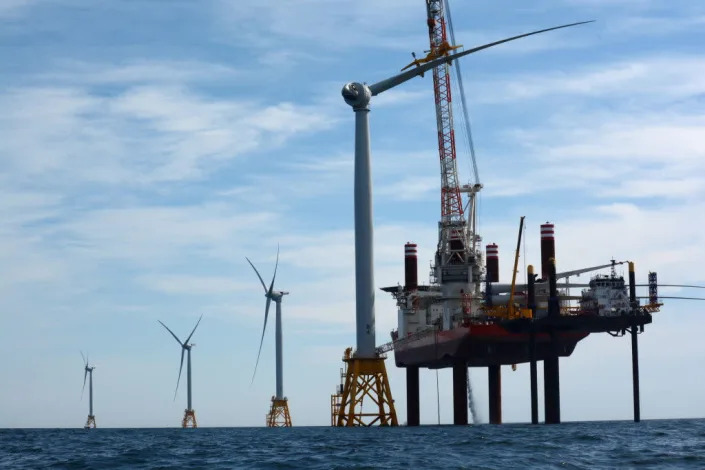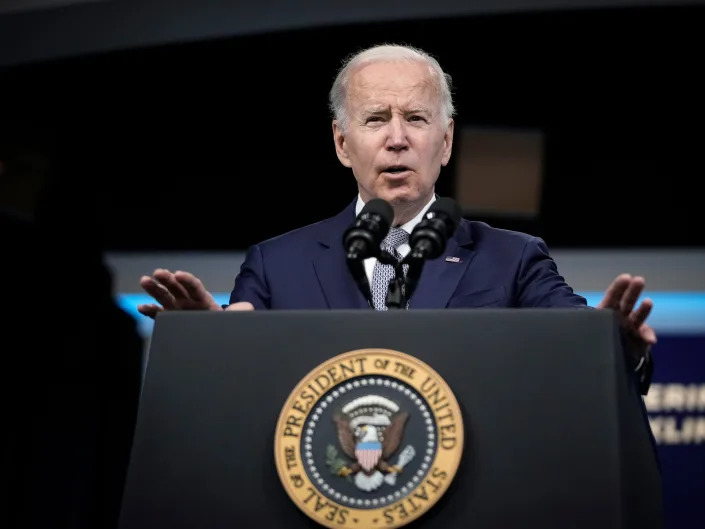The U.S. Senate Might Be About to Kill
Biden's Clean Energy Plans
Alejandro de la Garza
Thu, June 30, 2022
You might not expect to see fireworks in congressional debates over offshore energy worker regulations. But in a little-noticed March meeting of the House transportation and infrastructure committee, things got heated between Rep. Garret Graves (R., La.) and Rep. Jake Auchincloss (D., Mass.) as they argued over an amendment to the 2022 Coast Guard reauthorization bill that would ban foreign flagged ships with multinational crews from working off the U.S. coast. The back-and-forth ended on a sour note. “If my friend wants to keep hiring Russians, that’s fine,” Graves said.
“If my friend from Louisiana wants to thwart the clean energy industry in the United States,” Auchincloss responded, “then that’s fine.”
Committee chairman Peter DeFasio (D., Ore.) stepped in to note his support for the amendment and it ultimately passed. While not yet enacted—the bill will likely come up before the Senate commerce committee in the next month—wind energy proponents are worried. American Clean Power, a renewables industry group, said the new provision would “cripple” the offshore wind industry and stymie President Joe Biden’s efforts to build 30 gigawatts of offshore wind energy by 2030. (Unlike Europe and Asia, the United States has almost no offshore wind power at present, and even Biden’s aspirations lag far behind the ambitions of other countries.)
The crux of the debate comes down to certain kinds of highly specialized ships needed to perform mega-construction tasks like erecting huge turbine components and laying miles of underwater cables, which will be needed as offshore construction on the U.S.’s few approved ocean wind projects actually gets underway. The provision would mandate that only U.S. ships with American crews be allowed to work on offshore energy projects, including those big lift jobs, or, if foreign ships are used, they must be crewed either by Americans, or by sailors and workers that match the vessel’s flag of origin: for example, a ship flying the Norwegian flag should be crewed only by Norwegians.
There’s American boats to do a lot of the smaller supporting tasks around that construction, and the bill’s proponents say there’s a big problem of foreign boats with low paid workers taking American jobs. Of the few ships designed to do the specialized heavy lift work, most are registered in different countries than where the crew is from because of financial or regulatory expediency. Lower foreign wages give those ships an unfair advantage, say supporters of the new provision, effectively thwarting the U.S. shipbuilding industry from getting financing to roll out ships capable of building offshore wind turbines. “If the law continues to allow foreign entities to enjoy cost advantages we don’t have, and an unlevel playing field, we simply cannot compete with them,” says Aaron Smith, president of the Offshore Marine Service Association, an industry group that advised on the provision in the Coast Guard bill.
But that situation is also why the bill could mean big problems for offshore wind projects planned up and down the East coast: the U.S. simply doesn’t have many of those types of specialized ships, and the U.S. offshore wind market is so small that even blocking foreign ships from coming still might not make a good enough financial case to get American versions built.
“Every wind turbine installation vessel that is not able to come to the United States because of this provision would eliminate 1,460 megawatts of offshore wind from being installed a year, which would be 4.9 million tons of carbon dioxide,” says Claire Richer, federal affairs director at American Clean Power. Instead, she suggests subsidies to build U.S. offshore wind vessels, rather than mandates that block ships from working here.
In theory, foreign ships could switch their registrations and crews to comply with the law, though that could be difficult since some highly specialized personnel can’t be easily swapped out. Of some essential ships, like the nine worldwide designed to place wind turbine foundations on the seafloor, every single vessel is registered in countries like the Bahamas where the entire crew is permitted to be from somewhere else. And the harsh reality is that there’s so much offshore wind work to be done around the world that the owners of the ships are likely not to bother with the hassle, and just stick to construction jobs in Asia and Europe, leaving the fledgling U.S. offshore wind industry high and dry. And even if protectionism eventually helps build up a domestic offshore construction fleet, some in the offshore wind industry say that the result, free from international competition, would be inferior to the ships building wind power in Europe or Asia, meaning a slower offshore wind rollout.
The whole issue points to an uncomfortable opposition in the green energy transition: we need to decarbonize the economy as fast as possible to avert the worst effects of climate change, but the quickest and most efficient way of doing so sometimes means dropping politically popular protectionism in favor of free trade. The balance between efficiency and protectionism has been long established—things get cheaper when you open the doors to the foreign market, and some domestic industry suffers—and for decades the balance of U.S. policy was weighted firmly toward globalism. Then, around the 2016 election, Donald Trump’s campaign invoked the evils of the North American Free Trade Agreement (“The worst trade deal maybe ever signed anywhere.”) so many times as to make the position politically radioactive.
There’s lots of good reasons to prioritize U.S. green industry—and there’s an argument to be made that sometimes a bit of protectionism is necessary to get the ball rolling. But there are also trade-offs to blocking foreign competition. Usually, it means higher prices: more expensive steel and socks. In the case of offshore wind, it could mean even more delay in developing a desperately-needed source of green power as we wait for our own industry to catch up—assuming it ever really does. There’s a lot of jobs around offshore wind, and only some of them involve manning the ships that come by for a few months to drop components in the water. If the price of those additional American crews means tipping the climate balance even further in the wrong direction, our leaders should think carefully about if it’s really worth it for the rest of us.

















